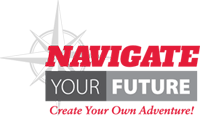
“Navigate Your Future: Create Your Own Adventure” is grounded in the belief that successful higher education is a partnership between students and educators in which students play an active role in charting their future. The Lee College Quality Enhancement Plan (QEP) is designed to help students develop the skills they need to navigate the educational process as well as set and achieve their educational and career goals in the modern world.
The target population is students most likely to be adrift at the beginning of their college career – those declaring General Studies or Undecided majors. While their educational route is guided by student support services currently in place, there is no intentional plan to incrementally engage students in the development of their way-finding skills with the ultimate goal of navigating the uncharted career waters in their future. To achieve this, Lee College will implement changes that convert disparate college systems into a unified process serving as a compass for students on their educational journey.
First, an electronic portfolio will serve as the foundation for systematically developing student engagement in their educational adventure. Students will document their progress in career exploration, goal setting, educational planning, course completion, and skill acquisition specific to their educational destination. Students, advisors, counselors, and faculty will work together to develop the students’ abilities to navigate college processes, support systems, and opportunities for personal growth related to their chosen goals. Documentation of achievement of their milestones in an e-portfolio will enable students to track their own progress and prepare for transfer or employment by demonstrating how the skills and knowledge they have gained will help them navigate to their chosen destination.
Second, mandatory enrollment in a Lee College student success course will be required of the target student population. This structured learning environment requires self-reflection, career exploration, goal clarification, academic program selection, and academic planning, along with the development of other student behaviors that lead to student persistence. These students will be tracked as a cohort beginning with their student success course. Student support services will provide navigational markers to keep these students on course via existing services such as new student orientation, case management advising, and freshman follow-up.
Third, team advising with Civitas Inspire for Advisors predictive analytics will allow continuous tracking of student risk factors for success, based upon predictive analytics, allowing faculty, advisors, and counselors the ability to keep students on course. Finally, supporting these changes will require enhanced professional development that targets assessment of academic and career planning, effective use of e-portfolios, and faculty training in Civitas Inspire for Advisors.
